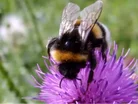Bees could cure drug-resistant superbugs

Beekeepers could hold the key to fighting antibiotic resistant superbugs after a new study has discovered the importance of drugs which are made from flower extracts.
Scientists believe that bees and their honey could be used to develop new drugs to fight superbugs, because they collect the nectar from such flowers.
Researchers from Cardiff University’s Welsh School of Pharmacy are now asking beekeepers to submit samples of their honey so they can test its medicinal qualities.
READ MORE FROM THE WDM CONTENT NETWORK:
To read the latest edition of Healthcare Global, click here
- Meningitis B vaccine will be available within months
- Genetic link found in migraines
- Mental illness research hit by funding crisis
If they are able to identify any useful chemicals within the honey, the School will send the DNA signature of the chemical to the National Botanic Garden of Wales so they can identify which plant it is from.
The Garden has just taken part in a huge project to barcode the DNA of every plant that is native to Wales and this would be the first practical use of the data.
“A lot of drug development involves expensive laboratory screening of a huge variety of plant products, often without success,” says Professor Lee Baillie from the Welsh School of Pharmacy.
“We are hoping to cut out the middle man and let the bees do a lot of the hard work, guiding to us those plants which work.”
Meanwhile, Dr Natasha de Vere from the National Botanic Garden of Wales, said in an interview: “We have nearly completed our Barcode Wales project to DNA barcode each of the 1,143 flowering plants in Wales and are excited to be developing our first applications that use this fantastic resource.”
She elaborated: “We can see which honeys have the best results against infectious diseases that affect humans and bees and use DNA barcoding to identify the plants making the honey.”
There have previously been indications that some honeys, for example manuka honey, contain properties that can beat superbugs like MRSA and C.diff, which currently have no treatments.
A recent study found that manuka honey was able to clear infections in festering wounds and on hospital surfaces.
Honey has long been used as an effective antiseptic treatment and has been utilised across the world in wound dressings and oral medications.
- Vaccine Breakthrough on Antibiotics Resistant DiseasesMedical Devices & Pharma
- The new superbug Candida auris and how to stop its spreadHospitals
- This is how to avoid a global superbug pandemicMedical Devices & Pharma
- Novartis Social Business: Blending profit with purposeMedical Devices & Pharma



